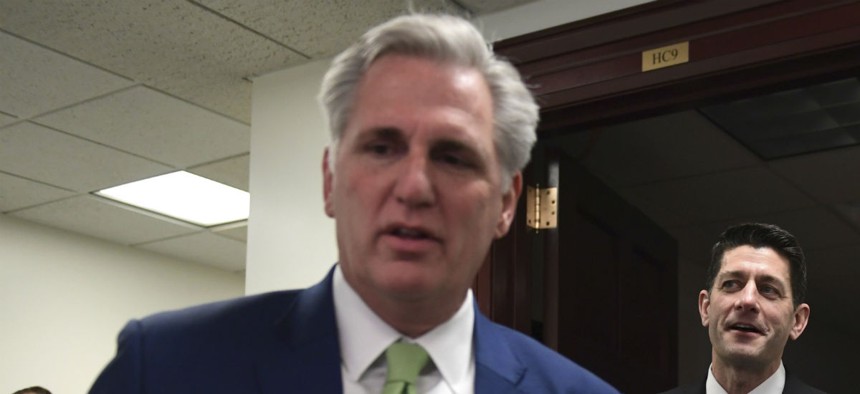Congress Likely to Consider Another Short-Term Funding Measure
House majority leader: Even if both parties reach a budget agreement before the Jan. 19 shutdown deadline, lawmakers will need additional time to craft a new bill.
House Majority Leader Kevin McCarthy, R-Calif., said Thursday that lawmakers should expect to vote on yet another stopgap measure to fund the government ahead of a Jan. 19 shutdown deadline.
McCarthy announced that another short-term continuing resolution is likely during a discussion with Minority Whip Steny Hoyer, D-Md., about the chamber’s schedule for next week.
Congress faces the prospect of a government shutdown in eight days, if lawmakers cannot come to an agreement on a spending deal. Lawmakers also must act to increase budget caps for defense and non-defense spending, or a sequester will kick in, in accordance with the 2011 Budget Control Act.
Even if lawmakers come to an agreement on a long-term spending deal before the Jan. 19 deadline, they likely will need additional time in order to craft accompanying legislation, McCarthy said, requiring a short-term CR.
“We have been in discussion to try to get a budget agreement, and I can hope that we can have that done this time,” he said. “But if we are able to get to that budget agreement, we’ll still need some time for appropriators to do their work, so we’ll have to have a CR.”
McCarthy said next week’s continuing resolution would be “clean,” or without other policy initiatives. But Hoyer reminded him of several issues that Democrats have demanded action on in exchange for their support.
“We want to make sure we can protect our ‘Dreamers’ . . . and we also need to do something with the Children’s Health Insurance Program,” Hoyer said. “We also need a supplemental [disaster relief bill] for Puerto Rico, the Virgin Islands and Texas. Now, we’ve passed the supplemental here, but not the Senate.”
Negotiators reportedly have been seeking a two-year deal to raise spending caps, which currently restrict government spending to $549 billion for defense and $516 billion for non-defense agencies in fiscal 2018. Democrats have advocated for the caps to increase by equal amounts for both defense and non-defense spending.
Despite the positive tones from party leaders on the talks, uncertainty has surrounded the subject because Democrats have said they would not support any agreement that did not include reauthorization of CHIP or protections for participants in Deferred Action for Childhood Arrivals, an Obama administration program preventing the deportation of around 800,000 undocumented immigrants who were brought to the United States as children. President Trump announced in the fall that he would end the program early in 2018.
Thursday saw two potential breakthroughs. According to The Hill, House Energy and Commerce Committee Chairman Greg Walden, R-Ore., told reporters that he plans to bring a six-year reauthorization of CHIP to the floor next week, and a bipartisan group of six senators led by Sens. Lindsey Graham, R-S.C., and Dick Durbin, D-Ill., released a statement Thursday afternoon announcing that they had reached a deal on DACA and other immigration issues.
“We have been working for four months and have reached an agreement in principle that addresses border security, the diversity visa lottery, chain migration/family reunification and the Dream Act—the areas outlined by the president,” the senators wrote. “We are now working to build support for that deal in Congress.”
Their statement did not get into the details of the deal, and it remains to be seen whether the House, other senators or the White House would go along with whatever they plan to put forward. President Trump has insisted that he receive funding for a wall along the U.S.-Mexico border in conjunction with any DACA fix, while some Democrats have urged their leaders to reject any proposal that cannot be considered a “clean” Dream Act.




